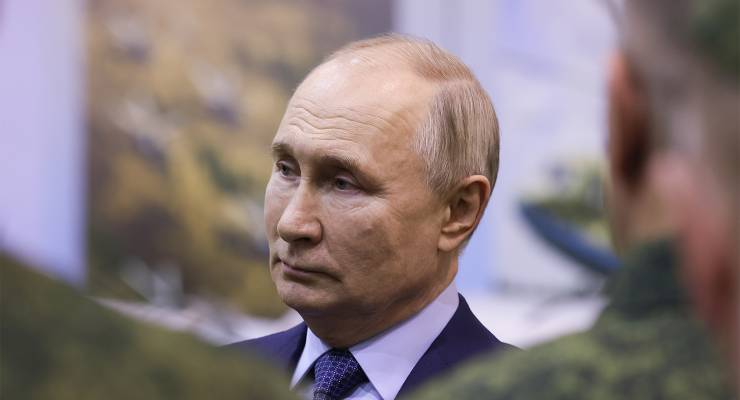
Three weeks before the terrorist attack on a Moscow concert hall where extremists killed 140 people and wounded more than 100 — with responsibility claimed by the Islamic State splinter group ISIS-K — Russian President Vladimir Putin lavished praise on the Federal Security Service, the country’s intelligence service.
Putin reasserted, just days before an election to cement him as Russia’s longest-serving leader, “the high status and the authority of the service as a key link in the system of ensuring state security and sovereignty of Russia”.
He claimed the agency “ensured public safety”, and that in “a difficult, often combative situation” the FSB “protected the state border and achieved new results in the area of anti-terrorism and the fight against extremism”.
“I would like to thank the FSB personnel for their professionalism and courage.”
Around the same time, the US warned the Kremlin and the public that extremists were planning an imminent attack. The State Department advised Americans to avoid large crowds and concerts in Russia.
The Kremlin’s response was to accuse the US of trying to “destabilise” Russian society.
The bloodshed at Crocus City Hall on March 22 underscores a disturbing trend of incompetence within the Russian intelligence community, glaringly evident since the invasion of Ukraine.
Multiple reports have highlighted a resurgence in Russian intelligence capabilities in the past year, noting their successes in recruiting agents in Europe, aiding Russia in evading Western sanctions and carrying out cyberattacks to gather valuable intelligence.
Yet, despite these reported successes, the failure to prevent the Moscow attack by militants claiming to be affiliated with the Afghanistan-based ISIS-K raises serious questions about the effectiveness and priorities of Russian intelligence.
Put simply, it failed to protect ordinary citizens.
Russian responses before and after the attack have followed a familiar pattern. Three days prior, Putin claimed that the US warning of a potential threat was nothing but “blatant blackmail and an intention to intimidate and destabilise our society”. After the mayhem, Russia’s ambassador to the US blamed Washington for the current lack of cooperation between the two countries in counterterrorism. The American view is that all previous attempts at cooperation failed due to a lack of Russian interest in productive relations.
The attacks are an embarrassment to Putin and his regime. On the night of the attack, the first security personnel arrived at the Crocus City Hall 20 minutes after the attackers had left in the same car they had arrived in, driving for more than 300km for hours on major highways, at times significantly exceeding the speed limit.
The FSB intercepted the car and arrested four people near the Russian border with Ukraine and Belarus. Basic questions remain over the FSB’s reporting of the situation, including simple ones like the number of terrorists involved and the weapons used in the attack.
Then there are more complex questions, like how the attackers appeared to be seemingly professional in their plotting and execution, as recorded by onlookers, yet their unexplainable lack of professionalism during their escape — the FSB claims the terrorists planned to cross into Ukraine, in an unfamiliar territory seething with Russian military and minefields.
The subsequent court proceedings involving 11 suspects the following day laid bare, in the most public manner, the routine torture practices of the FSB. If the visibly bloodied state of the suspects was not compelling enough, images and videos circulated on Telegram channels depicted the torture inflicted upon them.
In his first appearance 19 hours after the terror attack, Putin accused Ukraine of assisting in organising the “bloody barbaric act”, a charge Ukraine has vigorously denied.
Even after ISIS-K officially accepted responsibility, and the suspects were identified as citizens of Tajikistan, Putin continued to blame the West, implying that the organisers must be the same as “those fighting against Russia with the hands of the neo-Nazi Kyiv regime”. His propagandists, meanwhile, suggested multiple possibilities, from the US to “Zionist revenge over Russia’s position in Gaza”.
While Putin expressed scepticism about ISIS-K’s involvement during Ramadan, in the past ISIS disregarded Ramadan’s sanctity to carry out attacks. ISIS’ motivation behind such an attack should not be surprising, nor should cooperation between ISIS and Western intelligence agencies be sought.
Russia’s extensive military campaign in Syria supporting President Bashar al-Assad against ISIS has invited continuous threats of retaliation. Russia’s friendly relations with ISIS enemies, among them Hamas and the Taliban, a long-time ISIS target, and the ISIS-K’s attack on the Russian embassy in Kabul in 2022, could have given a taste of what was to come.
While Russian intelligence agencies demonstrated multiple failures since the beginning of its invasion of Ukraine, domestically, the FSB has successfully crushed dissent. It has arrested anti-war protesters and scientists, intimidated the wives of serving soldiers, and the soldiers themselves, and conducted intelligence activities in Ukraine and CIS states.
Recovering after its initial failures in Ukraine, Russian intelligence has successfully and skillfully wielded intimidation tactics, as illustrated by the funeral procession of Alexei Navalny and the sham elections that secured Putin a staggering 87% of the popular vote.
Although there appear to be few similarities between this terror attack and the apartment block explosions in Moscow in 1999, which were suspected to be orchestrated by the FSB and used as a pretext for the second Chechen war, there is little trust in the investigation to come, especially among Putin’s opponents.
There is little doubt the regime will use this terror attack to tighten the screws further — voices calling for the death penalty and talks of a new mobilisation round indicate some of the directions.
The security state appears to have delved into the darkest parts of Russian history for its first act, with official use of torture, a first since the practice was officially cancelled by no other than the infamous Lavrentiy Beria in his role as the minister of internal affairs in 1953.
In 2024, it was presented as a preventive measure in response to society’s demand, gathering hundreds of thousands of views on Telegram channels, and promises of a new terror attack by ISIS. This would provide President Putin and his regime with another opportunity to blame Ukraine and the West. Whether FSB will be able to prevent such attacks is immaterial.
Originally published under Creative Commons by 360info™.








Strange how this rebranded ISIS is now attacking enemies of the US. Russia, Iran, Syria, Afghanistan have all been attacked and perhaps Chinese interests in Pakistan as well. Makes one question who supports and funds them. Curious despite the current outrages in the holy land they don’t rage against you know who as well.
That Baroness Thatcher was a keen supporter of the mujahideen back in the 1980s. The US is a corrupted theocracy, my enemy’s enemy is my friend, etc etc.
That Hunter Biden has a lot to answer for.
It is really strange isn’t it? After a decade of Russia backing Syrian dictator Assad and bombing IS/ISIS separatists on his behalf, you’d think all would be forgiven and they’d be best of friends. They can hang out with Chechens and have a big party.
Perhaps China and it’s Russian subordinate are starting to find that if you play the imperial game, you are starting to take sides and not everyone will appreciate you for it.
There’s a lot of Middle East Oil money sloshing around. I suspect quite a bit of flows into the hands of the Islamic militants around the place.
After all it was the Wahhabi Sect in old Saudi Arabia of earlier centuries that backed the house of Saud. Doughty wrote about that relationship in his books 150 years ago.
It’s not really strange. I put up a comment with a link to an article about it, but it’s disappeared into awaiting moderation.
Still not ‘approved’ so I’ll describe it, no link. Greg Barton’s article in The Conversation, Why would Russia…
Wow Crikey.
To state that ‘The attacks are an embarrassment to Putin and his regime’ is like saying the 9/11 attacks were an embarrassment to Bush and his regime.
C’mon, I expect better than this from you.
9/11 was an embarrassment for Bush, as was October 7 for Netanyahu, as are the Moscow attacks for Putin. The attacks were a failure of intelligence, and of the government’s duty to protect the country and its citizens from threats.
However, I think it is OK for writers outside of Russia to mention a current Putin embarrassment without having to reference a history of other embarrassments in order to distract from the embarrassment in question.
And will continue to be while ever security agencies insist on looking inward to keep watch on citizens, rather than doing their proper jobs.
This piece is beyond risible – straight from the Langley VA fax.
No mention of the logistics, how the perps. travelled across Russia, found a convenient arms cache, did a dumb video of shooting up a room already full of bodies, the source/cause of the conflagration and left in the same car they arrived in and fled to the Ukraine border.
Looks like the Internet Research Agency has discovered “Crikey”.
I wouldn’t be surprised if the poor bastards arrested trying to flee towards Belarus actually had nothing to do with the attack.
This PhD candidate appears either ill-informed or mis-informed.
Parroting western media mistruths from her does Crikey a severe disservice.
This attack was not ISIS-K, the FSB are well on top of who did it, and the punishment will be severe to those responsible when Putin decides the time is right.
Please tell us what you know, and how you know it!
Love the newspeak formulation of your sobriquet. Very apt.